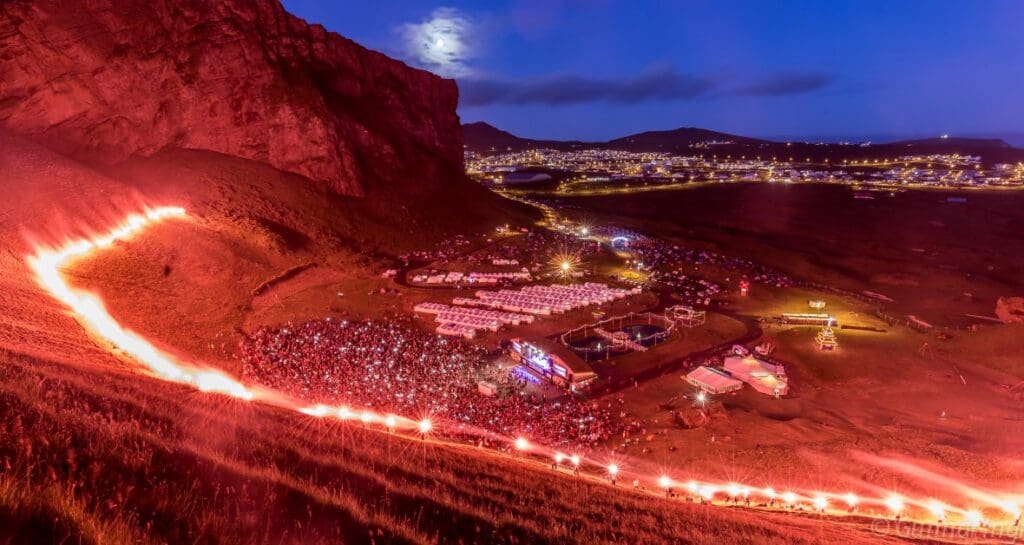Þjóðhátíð ( the national festival) is held in Vestmannaeyjar and it is the biggest music festival in Iceland and it lasts for three days. It starts on a friday and ends on a monday morning. It is a music and family festival and is just one of a kind. It has something for everyone both young and old. During the day we are entertaining the kids and having traditional family gathering in the white local tents. In the evenings all of the people are sitting together in the grassy hill in front of the main stage, and enjoy and listen to all of the best local artists in Iceland.
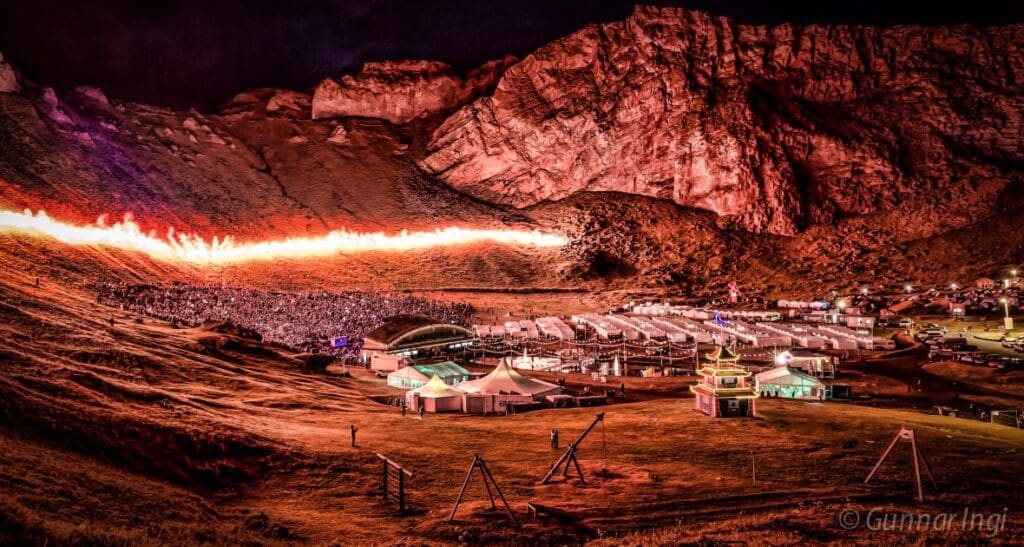
It’s not just an event, it’s a big party. The whole community comes together. Visitors can do many things. These show the island’s traditions and modern culture. The atmosphere is fun. Families and friends meet. The festival grounds are decorated. Music and laughter in the air.
One of the best things about Þjóðhátíð is that everyone can do it. People of all ages find something to do. There’s music, food and cultural displays. Tradition and modernity blends. That’s a lot of fun for everyone.
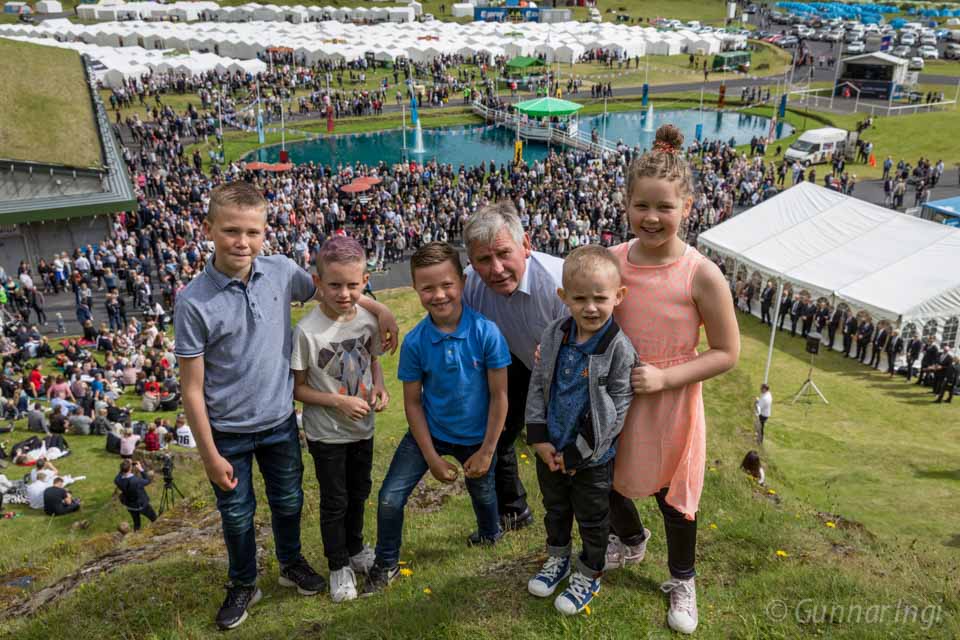
Þjóðhátíð started in 1874. It was 1,000 years since Iceland was settled. A big festival was planned at Þingvellir to celebrate 1,000 years of Christianity. Bad weather prevented people from the Westman Islands to travel to the mainland. Instead they created their own festival on the islands. And that’s how the National Festival (Þjóðhátíð) was born. This tradition has been kept and grown over the years.
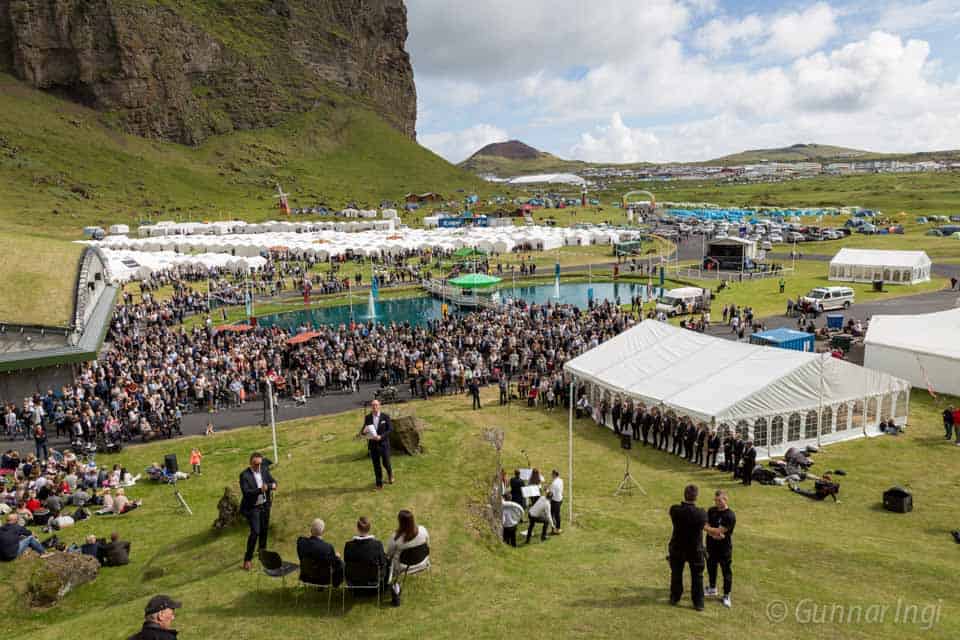
At first the festival was small. It showed the tight community of the Westman Islands. Locals gathered to celebrate their heritage. They sang traditional Icelandic songs, danced and played games. This kept their rich culture alive. The festival is also a part of the rich history of the Westman Islands, which adds to the overall experience of visitors. Over time the festival grew. More people from the mainland and other places joined. By the early 20th century Þjóðhátíð was a big event in Iceland. Better transportation made it easier for visitors to get to the island. That boosted the festival and brought new ideas.
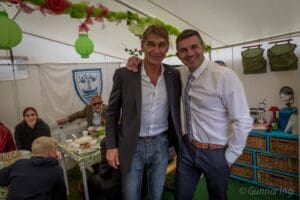
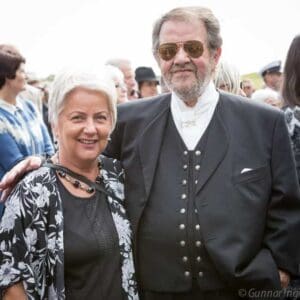
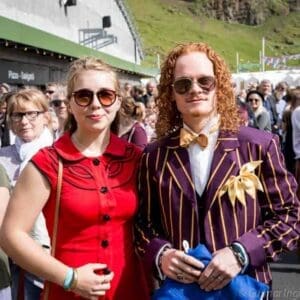
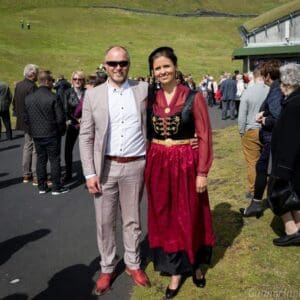
The festival’s key is to be able to adapt. It has changed but stays true to itself. Modern music attracts the young. Old traditions keep the older ones happy. That’s how the festival appeals to all ages. The bonfire on the first night, an old custom of community warmth and unity, is still a big part of the festival. People gather to watch the fire. It lights up the sky and that’s togetherness and shared history.
One of the best things about Þjóðhátíð is the feeling. As the festival approaches the whole community gets excited. Local families set up white tents in the valley. These tents, decorated with lights, is the heart of the festival. Families and friends gather here to eat, sing and celebrate together.
In the days leading up to the festival the tents are filled with homemade food. Traditional Icelandic food and modern food. The sense of community is strong as everyone helps to get ready. On Friday locals put on their best clothes and head to the festival grounds. The atmosphere is palpable.
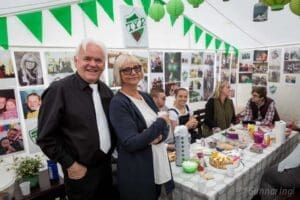
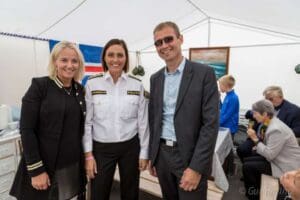
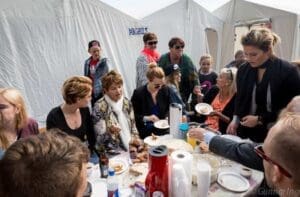
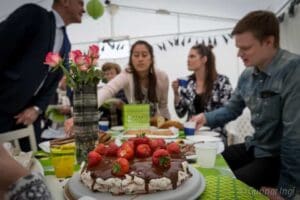
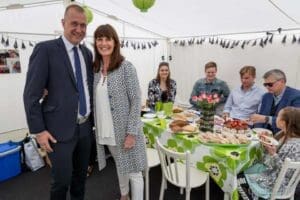
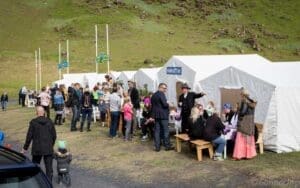
The festival is also a feast for the eyes. The white tents, decorated with lights and festive items, is a beautiful sight. The colours and atmosphere makes the festival grounds a lovely place to be. Visitors enjoy the sights and sounds while wandering around the attractions.
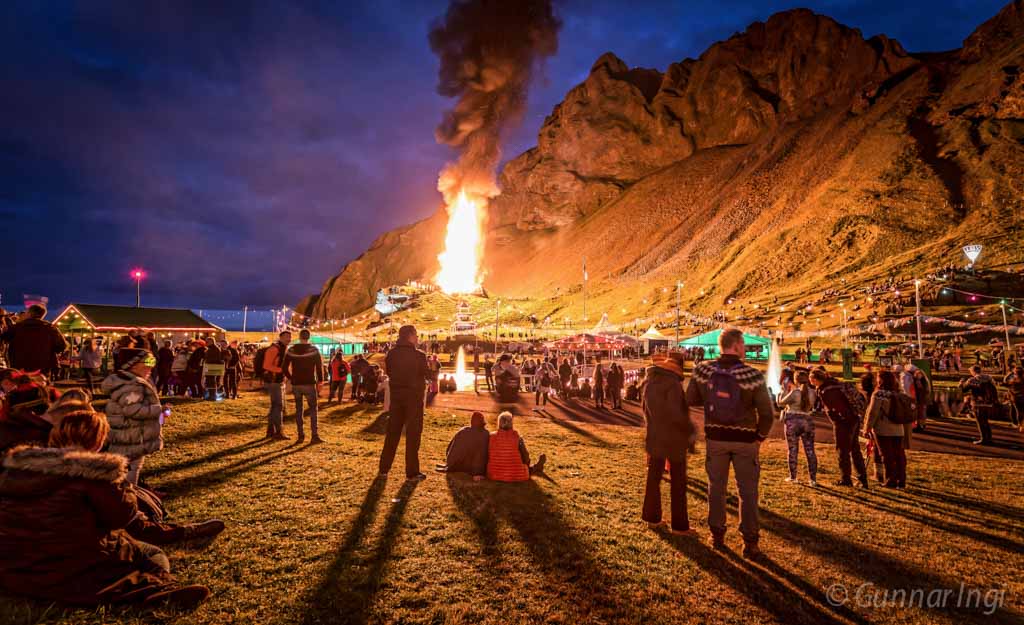
One of the most looked forward to events of Þjóðhátíð is the Friday night bonfire. This big fire is prepared with care. The community works together to build it. It takes teamwork, strength and courage. Only a few can get close to the bonfire site for safety reasons. But the whole community watches as the flames go up in the sky.
The heat from the bonfire can be felt from afar. It shines a warm, flickering light over the valley. This is often photographed. These pictures show the power and beauty of the fire. They become festival icons. The bonfire is more than just a show. It’s a symbol of the community’s strength and unity.
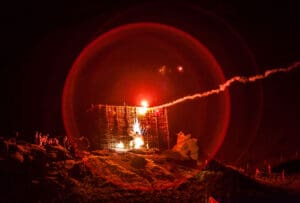
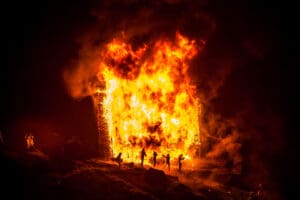
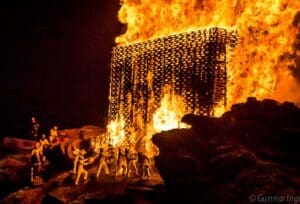
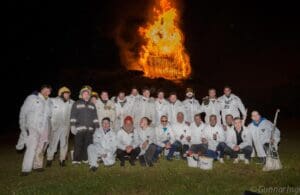
The bonfire is also a meeting point for festival-goers. People gather around the fire to tell stories, sing songs and enjoy the warmth. The bonfire is togetherness. The sight of the flames in the night sky is mesmerizing and comforting.
The tradition of the bonfire is old. It reminds the islanders of their power and ability to come together. The bonfire is the spirit of the Westman Islands and their commitment to keeping their culture alive.
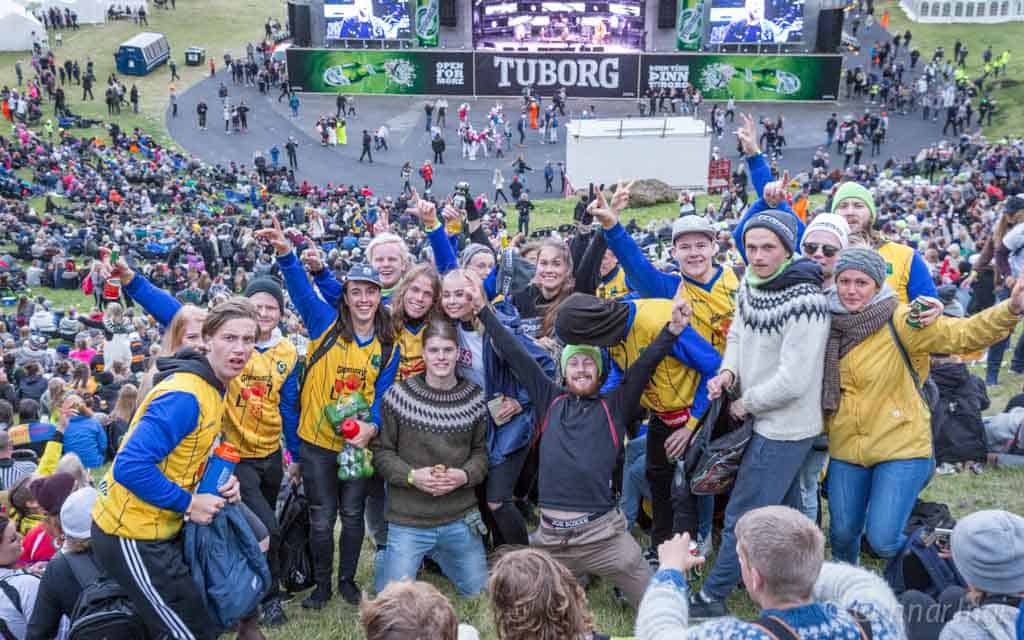
Music is at the core of Þjóðhátíð. From guitar sessions in the tents to big shows on the main stage music is everywhere. Every year the festival features Iceland’s most popular musicians. They perform against the beautiful backdrop of the Westman Islands. There’s something for everyone.
Saturday is a day of fun and chill. Families return to the valley to listen to music, have picnics and watch the kids play. The festival grounds is filled with laughter and music and the atmosphere is happy and relaxed. As the evening approaches everyone gathers on the hillside to watch the main acts. The new big stage adds to the experience with great sound and visuals.
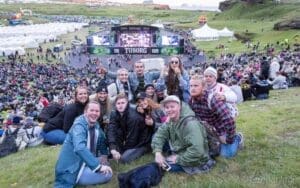
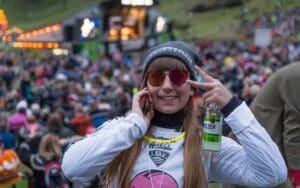
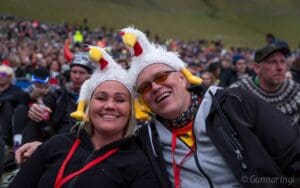

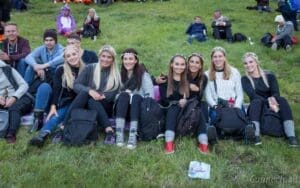
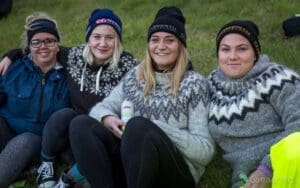
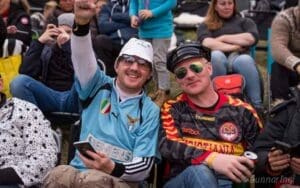
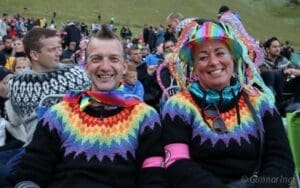
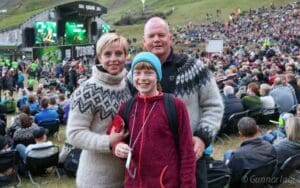

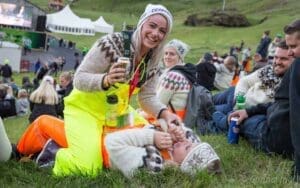
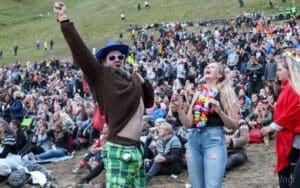
The music at the festival is varied. Traditional Icelandic music and modern hits. This mix of music is the festival’s old and new. Whether you like folk, rock or pop you’ll find something to like. The acts bring energy to the festival.
Music is not just for fun. It’s a way to connect with others. Listening to live music together brings people together. The musicians and their acts make each day of the festival special and memorable.
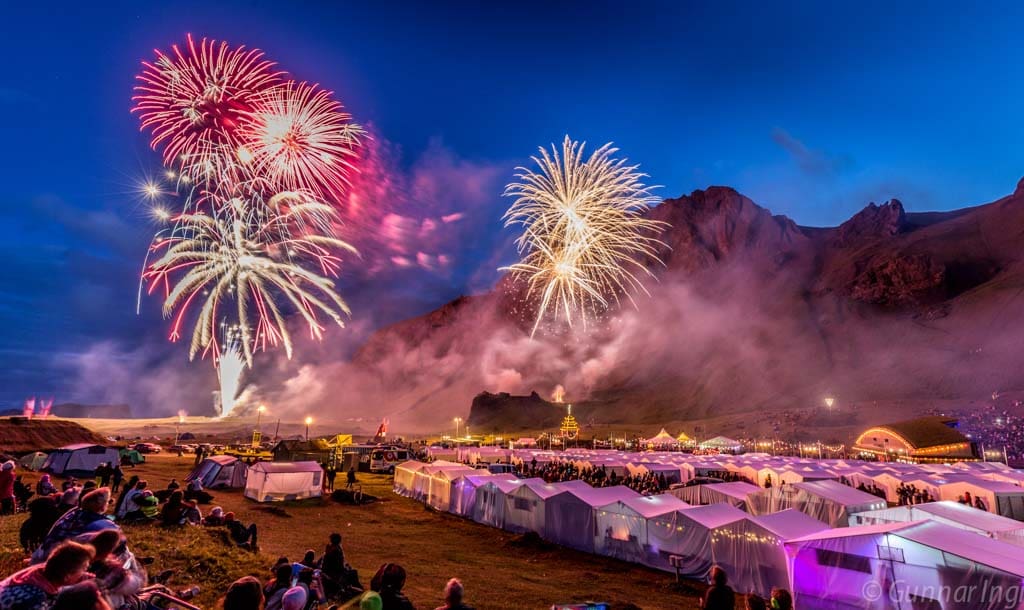
Saturday night is another highlight of Þjóðhátíð. A big fireworks show. The colours explode in the night sky. They bounce off the mountains and create a stunning sight. The fireworks are timed to music and add extra magic. Visitors often say this is breathtaking. The echoes from the mountains makes it even more beautiful.
Another tradition at Þjóðhátíð is the costume contest. Friends often dress up in silly and creative costumes. This adds to the fun of the festival. The costumes are judged and the best group wins a prize. This adds a bit of competition to the celebrations. This is what the Þjóðhátíð is all about.
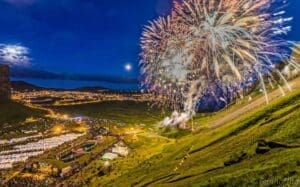
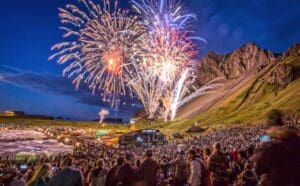
The fireworks is a favourite. The sight of the night sky filled with colours is breathtaking. Families and friends gather to watch the show, share the experience and make memories. The fireworks is the joy and excitement of the festival.
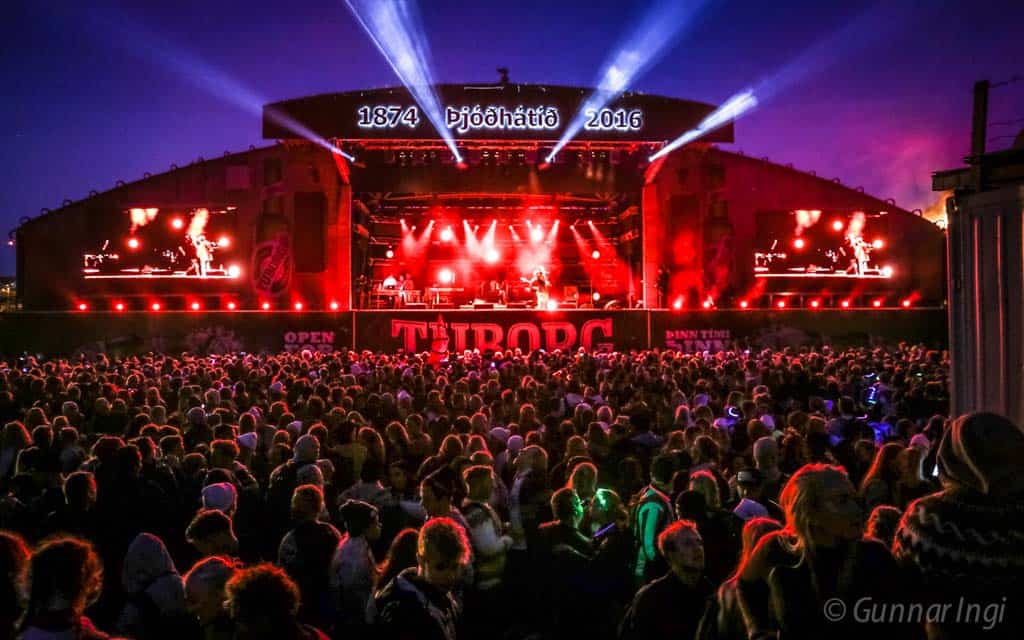
After midnight the party goes on and the younger people tend to party all night. Great music is played on big stage from the best bands and Dj´s in Iceland.
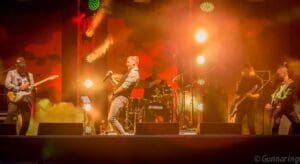
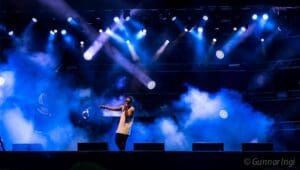
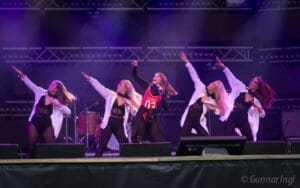
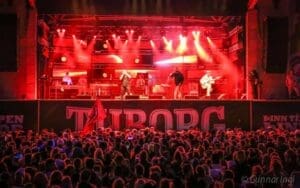
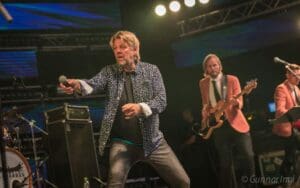
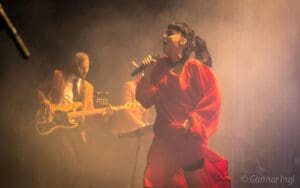
A big part of Þjóðhátíð is the famous guitar parties. They take place in the white tents. These are legendary in Iceland. They’re known for their lively and communal atmosphere. Every year a new festival song is introduced. This tradition started in 1933. The new song becomes part of the festival’s music.
The guitar parties have all kinds of music. Traditional Icelandic folk songs and modern hits. The tents becomes hotspots of music. People sing along, dance and enjoy the company of friends and family. The guitar parties shows the power of music to bring people together.
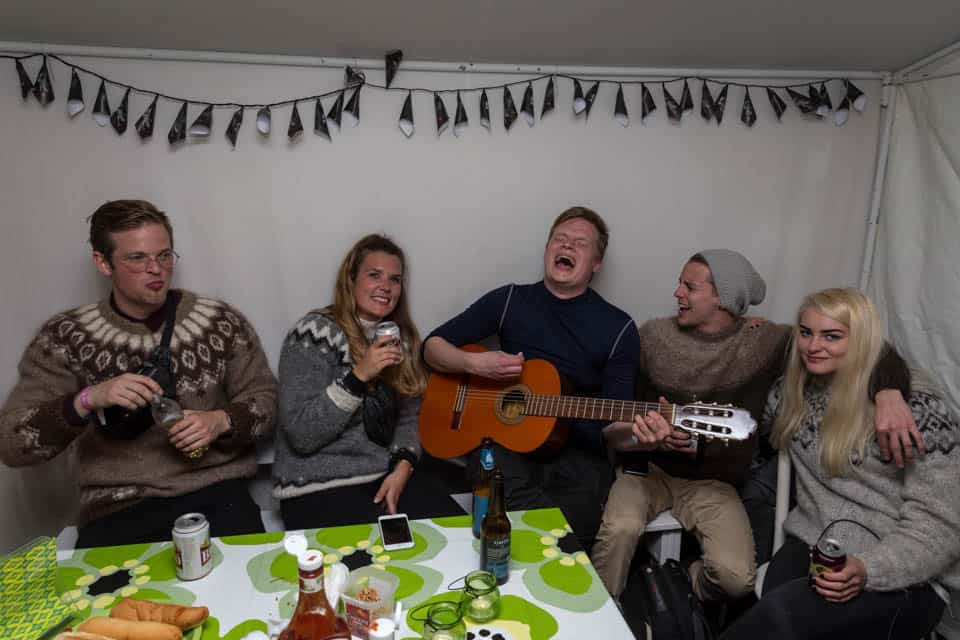
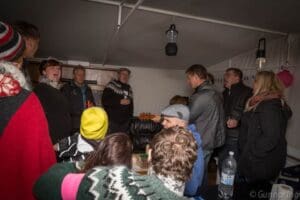
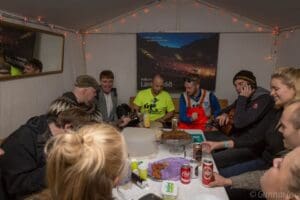
The guitar parties are more than music it is the core of the festival. People of all ages comes together to share their love of music. The relaxed atmosphere of the tents makes it easy for everyone to join in.
The tradition of the guitar parties has been kept alive for generations. It’s still popular and important. The guitar parties is part of the festival. It’s about the power of music to bring people together.
The grand finale of Þjóðhátíð is on the Sunday night. It’s the most popular night of the festival. Over 15,000 people gathers on the grassy hillside to sing along. Led by a single performer with acoustic guitar on stage and the crowd sings together. Thousands of voices singing in unison is an experience like no other. It feels like unity and happiness.
At midnight this year the valley will lit up with 150 red flares. Each flare representing the years that we have held this festival. This is followed by another fireworks display. The valley glowing red with fireworks in the sky is a perfect ending to the festival.
The sing-along is emotional. It brings people together in harmony. The simple setting with one guitarist makes it even more beautiful. The sing-along is the best of the festival and will be remembered.
The final fireworks is a big ending to the festival. The bursts of light and color in the night sky is a happy ending. The fireworks reminds everyone of the fun of the past few days and they’ll have happy memories.
Þjóðhátíð is all about community. It’s a group effort. Everyone is part of it. From preparing the bonfire to organizing music and shows, the festival shows the power of community.
Locals open their homes and tents to visitors. They share food, stories and traditions. This creates a warm atmosphere. Everyone feels part of the community. The festival is not just an event, it´s a celebration of the island´s Heritage.
The community is involved in every part of the festival. From planning to execution locals are the key. Their commitment makes the festival special. The community’s effort and participation is what makes Þjóðhátíð unique.
Þjóðhátíð is the highlight of the year but the Westman Islands has more to offer. The islands are beautiful. They have steep cliffs, green valleys and rich wildlife. The southernmost point is a popular spot for birdwatching. Puffins is a big attraction. Elephant rock is a popular photo spot. You can often see them up close. The South Coast of Iceland makes the islands accessible.
The islands also has a interesting history. It’s shaped by volcanic activity and maritime traditions. Eldfell volcano is a key highlight, offering spectacular views and historical significance. The Eldheimar Museum offers a simulation of the 1973 volcanic eruption. You can learn about the community’s resilience in the face of natural disaster. The new land formed by the 1973 eruption is a major attraction. During the eruption, all the fishing boats were in the harbor, leading to a complete evacuation of the island.
Outdoor lovers will find plenty to do in the Westman Islands. Hiking, bird watching, exploring sea caves and kayaking is on the menu. The small islands play a role in bird egg collection. The islands’ unique geography makes it a nature lover’s paradise. Boat tours are available to see puffins, explore sea caves, and enjoy unique attractions like Elephant Rock.
The Westman Islands is also rich in cultural heritage. You can visit historical sites and learn about maritime traditions. The local museums will give you an insight in the island’s history. Heimaey Island is the largest and most populated island. This little island has a rich history, including the Barbary Pirates' invasion and the volcanic eruption in 1974. The combination of nature and culture makes the Westman Islands a great destination. The Westman Islands archipelago is known for its natural beauty.
The Sea Life Trust Visitor Centre gives the opportunity to visit the Beluga Whale Sanctuary, home to two former captive beluga whales, Little Grey and Little White. The golf course on Heimaey is a starting point for a hike to Herjólfsdalur; be mindful of golf balls while walking along the path.
Every year Þjóðhátíð in the Westman Islands introduces a new song. This tradition started in 1933 and has become a big part of the festival. The annual song is highly anticipated by the locals and the visitors. It captures the spirit of the festival and the theme of the year.
The release of the song is a big deal. It’s usually released a few weeks before the festival and gets everyone excited. The community comes together to learn the new lyrics and melody so they can sing along during the festival. The song is performed live on the main stage and everyone joins in. This is the highlight of the festival and creates a sense of togetherness and joy.
The song is usually written by a local artist or a well known Icelandic musician. The lyrics often celebrate the community, the island’s heritage and the festival itself. The music is from folk to modern, so there’s something for everyone. The song becomes a part of the festival and is played during various events and gatherings.
Each year the song is a reflection of that year’s festival. It might include references to recent events, changes in the community or themes of resilience and celebration. The annual song helps preserve the cultural heritage of the Westman Islands and connects the past with the present.
The annual song is more than just a song. It’s a way for the community to express itself and its pride. It brings people together and creates a sense of belonging and continuity. The song becomes a memory for everyone who attends the festival, a musical snapshot of that year’s festival.
Visitors to Þjóðhátíð look forward to hearing the new song. For many it’s the highlight of their trip. The song is not just a piece of music but a symbol of the festival’s spirit. It’s a proof of the creativity and resilience of the Westman Islanders, celebrating their culture and community every year.
If you’re coming to the Westman Islands for Þjóðhátíð here’s what you need to know:
Þjóðhátíð in the Westman Islands is more than a festival. It’s a celebration of culture and community. From the history to the music and fireworks it’s a unique experience. Whether you like the bonfire, the guitar parties or the fireworks Þjóðhátíð will take you on an Icelandic journey.
So book your calendar, pack your bags and get ready for Þjóðhátíð. The Westman Islands is waiting for you.
